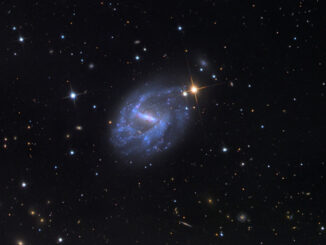
Pegasus

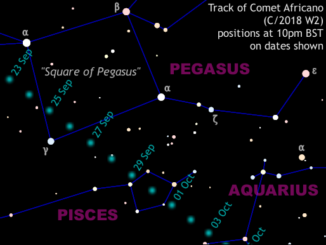
Watch Comet Africano (C/2018 W2) pass closest to Earth in late September
At around magnitude +9, C/201 W2 (Africano) is the brightest comet currently on show, passing closest to Earth on 27 September slightly less than half an astronomical unit away. Speeding through the constellations of Pegasus, Pisces and Aquarius, Comet Africano also lies within a binocular field of view of outermost planet Neptune on the night of 3–4 October.
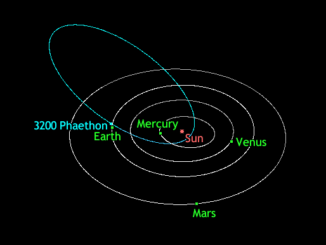
See asteroid Phaethon, source of the Geminids, in a close brush with Earth
As shooting-star devotees prepare for the naked-eye spectacle of the Geminid meteor shower in mid-December, owners of small telescopes can also witness the close passage of the meteors’ parent body — a curious “rock comet” known as 3200 Phaethon, galloping through the constellations of Auriga, Perseus, Andromeda, Pisces and Pegasus at a rate of up to 15 degrees/day.
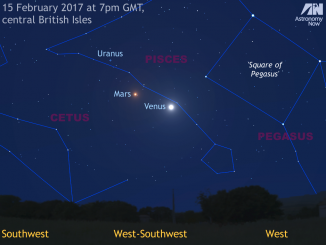
See planet Venus hit peak brightness in the evening sky
Currently setting over four hours after the Sun as seen from the heart of the UK and visible in the west-southwest at dusk, dazzling Venus is about to hit peak brightness in the constellation of Pisces. The planet attains magnitude -4.8 on Friday 17 February — some 21 times the luminosity of brightest star Sirius gracing the southeast horizon as darkness falls.
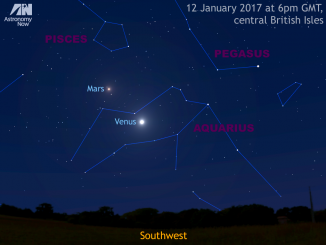
See Venus farthest from the Sun, in conjunction with Neptune on 12 January
Thursday 12 January brings not only a full Moon, but also finds brightest planet Venus at its greatest easterly elongation from the Sun. By the time darkness falls in Western Europe and the UK, Venus also lies just 0.4 degrees from outermost planet Neptune, while Mars lies less than the span of a fist at arm’s length to their upper left.
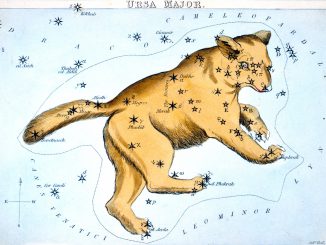
International Astronomical Union formally approves 227 star names
The creation of a specialised IAU Working Group, the Working Group on Star Names (WGSN), was approved by the IAU Executive Committee in May 2016 to formalise star names that have been used colloquially for centuries. WGSN has now established a new catalogue of IAU star names, with the first set of 227 approved names published on the IAU website.
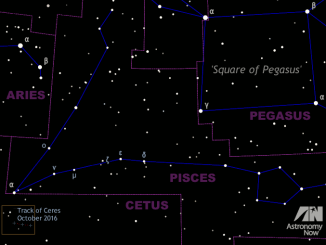
How to find Ceres, the nearest and brightest dwarf planet at its best
Ceres, the largest minor planet inside the orbit of Neptune, passed closest to Earth on the evening of 22 October — the night of the last quarter Moon. With the lunar crescent now confined to the morning sky, grab your binoculars or telescope, print out some star charts from our online guide and track down the brightest of the dwarf planets while at its best.
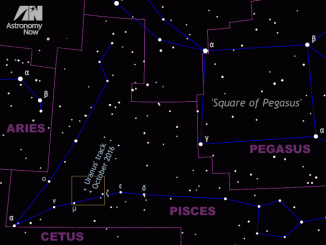
See planet Uranus at its best in the autumn sky
Have you ever seen Uranus with the naked eye? If not, moonless nights in October offer ideal conditions to test your visual acuity and sky clarity. Uranus reaches opposition on 15 October and attains a respectable altitude in the southern sky as seen from the British Isles. Here is our guide to tracking down the seventh planet from the Sun.

See asteroid 2 Pallas at its best during August 2016
During the Perseid meteor shower, second-largest asteroid 2 Pallas passed close to the southeast of globular cluster Messier 15 in the constellation of Pegasus. The minor planet still lies in the vicinity of this beautiful deep-sky object, reaching opposition on 20 August — here’s our in-depth guide to Pallas at its best.
